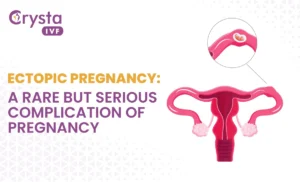Key facts:
- Celiac Disease is a genetic disease that can affect your digestive system.
- It is a rare disease estimated that 1 out of 133 people has this disease or about 1% of the population.
- Studies suggest that celiac disease may be linked with the person that has infertility disorders too.
- Celiac disease affects both men and women.
- Studies may find that women diagnosed with celiac disease have infertility issues too.
What is Celiac Disease?
Celiac Disease is a genetic autoimmune disease that affects your digestive system. In this disease, an immune reaction can affect a diet of gluten (a protein found in wheat and barley).
When a person with celiac disease consumes gluten (eats something with gluten), it causes inflammation and overreacts, causing damage to the small intestine.
Celiac disease may cause several medical complications. Although it does not have severe symptoms, the damage to the intestinal lining is prolonged, so it can take years to get a diagnosis.
What is Infertility?
Infertility is the failure to conceive within a year or more of regular unprotected coitus. To have a healthy pregnancy, a woman and her partner must both be in good health.
In nearly 30-40% of infertility cases, men are directly responsible for the conception, while women are directly responsible in about 40-55% of cases.

Several factors cause infertility. It can be caused by a tubal blockage in the female reproductive system, uterine disorders, ovarian disorders, obstruction of the male reproductive tract, hormonal disorders, etc.
To achieve a healthy conception, these are vital;
- A healthy female body must release a healthy egg from the ovaries every month.
- A healthy motile sperm must fuse with the egg along the way to fertilize.
- The fertilized egg must go into the fallopian tube (a tube-like structure where fertilization of egg and sperm takes place) released toward the uterus (womb).
- After fertilization, the embryo (the early stage of development) must attach to the inside of the uterus. Joining the embryo to the uterus is called implantation.
The connection between Celiac Disease and Infertility
As a result of its autoimmune nature, celiac disease can cause several unrelated problems affecting a person’s body’s metabolic processes without confirming the diagnosis. It may cause anemia, depression, bone diseases, and may cause infertility in men or women.
Somehow, it is not yet clear why more people with undiagnosed celiac disease have infertility. Some theories and factors are yet to be discovered.
The impact of celiac disease on the immune system may cause reproductive issues like miscarriages, stillbirths, low weight in newborns, or short lactation duration.
Some theories can maybe help in explaining possible connections:
- Celiac antibodies: A high level of antinuclear antibodies can affect a woman’s body attacking itself. A study of reproductive immunology research has shown that celiac disease produces antibodies such as an antinuclear antibody (ANA), which could adversely affect early pregnancy and lead to frequent miscarriages.
- Nutritional deficiency: If celiac disease is left untreated, you are highly likely to be deficient in all essential nutrients like iron, zinc, calcium, folate, and more needed for a healthy reproductive life.
- Hormonal problems: Women are more likely to suffer from undiagnosed celiac disease, which results in lower BMI due to malnutrition. In turn, this malabsorption can result in hormonal imbalances resulting in a delayed onset of menstruation or early onset of menstruation, which ultimately affects fertility.
Infertility and celiac disease in women
In several medical studies, it was found that women who have celiac disease are at a higher risk of infertility in other ways as well.
According to clinical studies, women with celiac disease are more likely to have an abortion, have a low birth weight baby, and have a shorter nursing time. Females with celiac disease also suffer from a deficiency of folic acid, iron, vitamin D, and vitamin B12.
Infertility and celiac disease in men
There have been rare cases of male infertility with celiac disease. About 1% of a male is infertile with celiac disease.
A man with celiac disease may have gonadal dysfunction that could complicate fertility issues.
Also, there could be hormonal changes affecting sperm and its morphology or in the structure of sperm. Additionally, celiac disease can lead to low sperm counts.
One study found that more than 19% of married celiac men (men with celiac disease) had infertile marriages. In addition, celiac men suffer more regularly from androgen resistance, which means their bodies do not respond to the male hormone testosterone.
Diagnosis of celiac disease and infertility
The diagnosis of celiac disease is essential to rule out the causative factor of infertility. Therefore your doctor will ask some questions about physical symptoms and perform a complete physical examination.
- To have a surety about celiac disease, the doctor will advise you to have an endoscopy. In endoscopy, a thin, lighted tube is inserted inside of your small intestine. The doctor may take some tissue samples to be further tested in the lab, called a biopsy.
- Some blood tests can also ask to check for anemia or a bone density test that will help find out other problems.
- Depending on your doctor, you may be advised to undergo some fertility tests.
Specific diagnostic tests for men-
A health care professional may recommend specific fertility tests for men. These are some tests for men:
- Semen examination: You may be asked by your doctor for your semen specimens.
- Blood test: Your doctor may ask you for a blood test that determines the level of hormones like testosterone and other male hormones.
Specific diagnostic tests for women-
Some fertility tests that can be specified infertility in women are:
- Blood Test: Some blood tests measure hormone levels to determine whether you are ovulating or not.
- Hysterosalpingography: This evaluates your uterus and fallopian tube condition and can also look for blockages or other problems. In this process, x-ray contrast is injected into your uterus, and an x-ray is taken to determine if the uterus and fallopian tubes are normal or not.
- Hormonal Testing: Some other hormonal tests can check levels of ambulatory hormones as well as pituitary hormones that control reproductive processes.
How can Crysta IVF help in managing infertility and celiac disease?
Crysta IVF can help infertile patients diagnosed or undiagnosed with celiac disease by adequately understanding their medical history, cause of infertility, etc.
Our fertility experts diagnose your infertility as well as signs of celiac disease, give you proper counseling, required treatment, education along with prevention measures, and regular follow-up.
In addition to the fertility consultation, the doctors at Crysta IVF will screen your symptoms and provide you with the necessary counseling to manage your symptoms, associated risks and help give the best infertility treatment.
Conclusion
Infertility, miscarriages, and stillbirths may be caused by celiac disease, but its certainty makes a difference as there is a lack of scientific evidence that backs up this information.

With proper medical guidance, diagnosis, and management, reproductive problems like miscarriage, low birth weight newborns, short lactation duration, or infertility in women with celiac disease can be improved by a diet that cannot have gluten in it.
Additionally, most scientists agree that celiac disease – in particular in women – is linked to infertility without clear explanation, especially if left untreated. Therefore proper guidance and management are required. But in men, the link between celiac disease and infertility is yet to be discovered.




